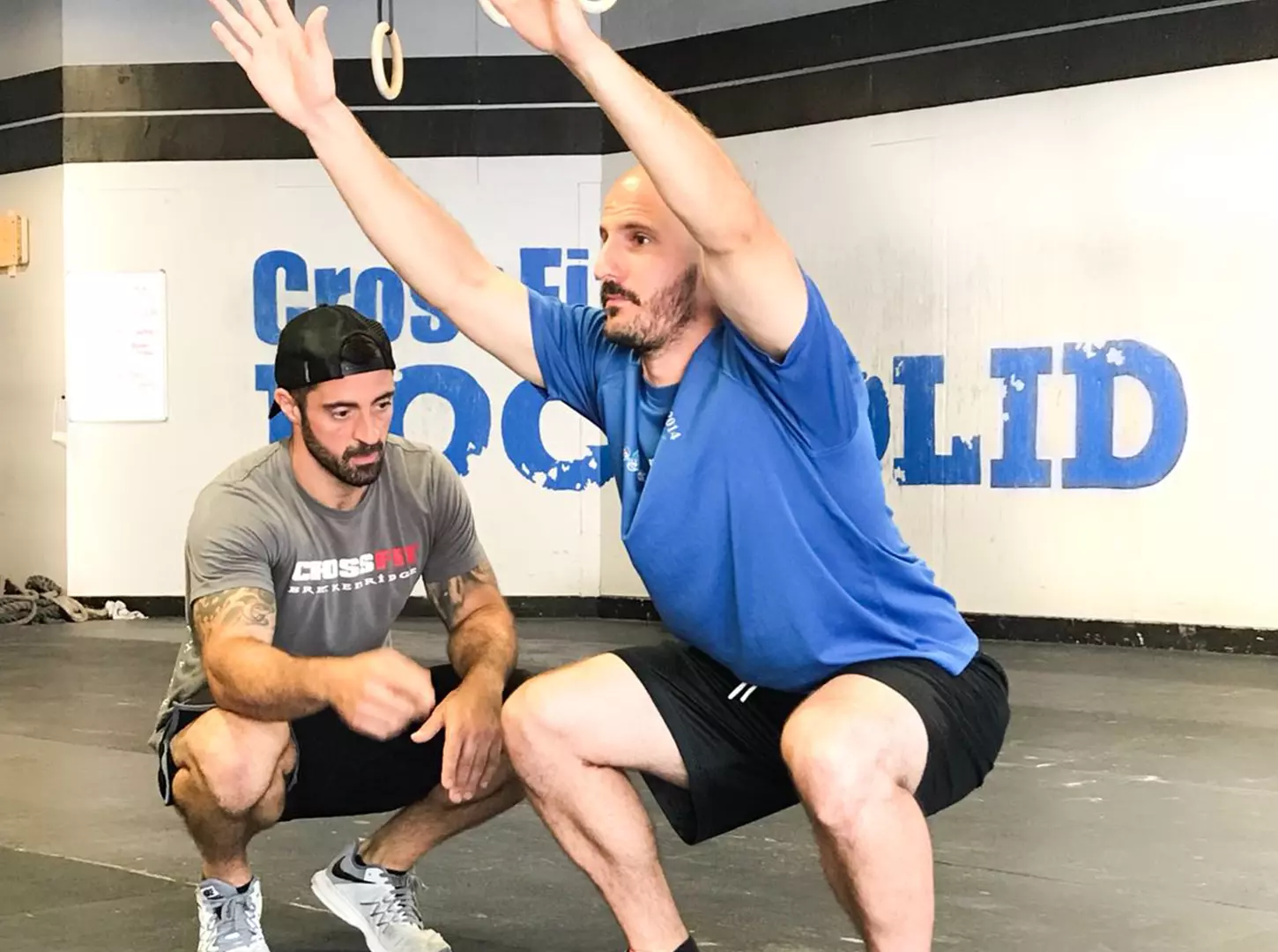More Than Just A Gym.
Are You Ready To...

Go To The Next Level Together?
Working out is always more fun when you’re in the company of others. Our workouts are designed with this idea in mind so we can help empower people and pass on knowledge about living a healthy lifestyle!

have a solid game plan?
Don’t let a lack of experience hold you back from achieving your fitness goals. Join CrossFit Rock Solid and receive personalized coaching to help you succeed, no matter your skill level.

Get More Done In Less Time?
Ready to achieve your goals and get more out of life? Join us and receive expert coaching that will help you succeed. We’ll help you create a plan for success and provide the support you need to achieve your goals.
Then We Are Ready...
To Guide You On Your Journey
No Matter Your Skill Level or Experience!
That's Why We've Created
FUNCTIONAL FITNESS PROGRAMS
TAILORED TO MEET YOU WHERE YOU ARE

GROUP BASED
CrossFit
These 60-minute classes are led by a coach who will both educate and motivate you. Our program delivers proven results and will challenge athletes at any and all skill levels. More importantly, every workout is and can be tailored to the needs and fitness level of the athlete.

GROUP BASED
Rock Solid Kids
Introduce your little ones to a world of fitness, fun, and growth with our Rock Solid Kids classes! Our specialized fitness classes are designed to ignite a love for physical activity in children, fostering a healthy and active lifestyle from an early age. Led by our experienced coaches, Rock Solid Kids classes combine age-appropriate exercises, games, and challenges to promote strength, coordination, flexibility, and confidence.

GROUP BASED
Evolve Classes
In our EVOLVE classes, you will still experience the benefits of functional training and a supportive community without feeling overwhelmed. Whether you’re recovering from an injury, starting from scratch, or simply prefer a less intense approach, our EVOLVE class is designed to help you progress at your own pace and build a solid foundation for your fitness journey.

GROUP BASED
Uniquely Abled Fitness
Uniquely Abled Fitness is now offering classes at CrossFit Rock Solid! This program’s mission is: “To enable individuals with intellectual and developmental disabilities to engage in an inclusive fitness program where each athlete can grow physically, emotionally, and socially.” Contact us today for a free consultation!

ONE-ON-ONE
PERSONAL TRAINING
Elevate your fitness journey with personalized attention and expert guidance through our personal training program at CrossFit Rock Solid. Our certified and experienced personal coaches are committed to helping you reach your unique fitness goals, whether it’s building strength, losing weight, improving athletic performance, or enhancing overall fitness.

habit shifting
Nutrition Services
WHAT ARE PEOPLE SAYING
CUSTOMER REVIEWS
Are You Ready To Level Up?
Getting Started Is Easy!
1. SCHEDULE YOUR FIRST VISIT
Talk with a coach about your goals and meet our trainers, tour the gym, and learn more about our programs.
2. START YOUR TRAINING
To ensure a strong start, we'll guide you through our fundamentals course and help establish healthy habits, putting you on a path toward success.
3. HAVE FUN REACHING NEW LEVELS
Book classes easily on our app, improve your fitness, and enjoy the workouts with awesome people and reach your goals in no time!
CrossFit Rock Solid
Our Current Schedule
Have Questions? We've got the answers right here!
Super simple! Just click get started anywhere here on the page to book your free intro session where you’ll get to tour the gym & meet our coaches.
We will chat about your current situation, your desired situation to see if we can help and if we are good fit for each other. Sign up today!
When you start at CrossFit Rock Solid, your fitness level will improve quickly, usually in the first 30 days.
The key to see results is consistency and commitment over time so that’s why we recommend 3 classes per week as a start. Sign up today!
Yes! We provide guidance on eating right or sleeping well which can help maximize energy levels – getting YOU maximum results from your efforts. Sign up today!
Nope! Most of our members start just like you. We assess each new members fitness level.
Then our workouts are “universally scaled”, with a different version of each days workout designed for every level. As you level up you can take on more challenging variants of the workout if you desire. Sign up today!
We are locally owned and purpose built to make an impact on the health and happiness in Downingtown and the surrounding area.
You’re not just a number here, everyone knows your name. We’re a community of like-minded people that wants you to show up and supports each other on this journey to live better lives – with no judgement or criticism along the way. Sign up today!
If you’re a beginner and just starting out then 2-4 times per week will be enough to see results and allow you to adjust.
You’ll be sore some days, so allow yourself recovery days between training sessions at first – over the course of the following months work up towards 5 days per week if you want to maximize! Sign up today!
We offer an exciting, challenging and varied programming which will keep it fun! The workouts are published in advance
Some days are more strength focused where will focus on our lifts. Movements like barbell squats, kettlebell swings and occasionally some olympics lifts will be included.
Other days, we may focus more on cardio & conditioning with rowers and bikes. Some days are focused on body weight movements like pushups, sit-ups, and pull-ups. Some days are a mix of everything. Sign up today!
Each class is 60 minutes and led by qualified coaches. We always start together with a warm-up designed to activate the muscles being used in the workout.
The coach will brief on the group on the workout, the movements, and the proper form. During the workout, the coach will be guiding and providing instruction.
At the end of class, we will cool down together to accelerate recovery and reduce potential injury. Sign up today!



